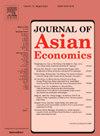Policy intervention and stock market stability risks: Evidence from carbon emission trading policy on energy firms in China
IF 3.4
3区 经济学
Q1 ECONOMICS
引用次数: 0
Abstract
Stock market volatility, crucial for financial risk management and investment decisions, is significantly influenced by carbon emissions trading policies. This study applies the GARCH-MIDAS-EPU model to estimate the long- and short-term volatilities of 30 A-share energy firms and employs the HD-TVP-VAR model to assess contagion effects. Using carbon emissions trading policy as a quasi-natural experiment, it examines the policy’s impact on firm-level volatility and net spillovers. The results indicate that short-term volatility exhibits strong clustering, while long-term volatility follows a non-linear adjustment path with regime shifts. Increased short-term volatility spillovers amplify contagion risks, whereas persistent long-term spillovers suggest sustained investor focus. Carbon emissions trading heightens firm-level volatility and influences short-term spillover dynamics but has an insignificant effect on the long-term net spillover index. The policy’s impact varies by firm characteristics, with centrally state-owned firms facing fewer financial constraints benefiting most from incentives.
政策干预与股票市场稳定风险:来自中国能源企业碳排放交易政策的证据
股票市场波动对金融风险管理和投资决策至关重要,它受到碳排放交易政策的显著影响。本研究采用GARCH-MIDAS-EPU模型对30家a股能源企业的长短期波动率进行估计,并采用HD-TVP-VAR模型对传染效应进行评估。本文将碳排放交易政策作为准自然实验,考察了该政策对企业层面波动性和净溢出效应的影响。结果表明,短期波动率表现出较强的聚类性,而长期波动率则表现出随制度变迁的非线性调整路径。增加的短期波动溢出效应放大了传染风险,而持续的长期溢出效应表明投资者持续关注。碳排放交易提高了企业层面的波动性,影响了短期溢出动态,但对长期净溢出指数的影响不显著。该政策的影响因企业特点而异,面临较少财务约束的中央国有企业从激励措施中获益最多。
本文章由计算机程序翻译,如有差异,请以英文原文为准。
求助全文
约1分钟内获得全文
求助全文
来源期刊

Journal of Asian Economics
ECONOMICS-
CiteScore
4.70
自引率
9.40%
发文量
90
期刊介绍:
The Journal of Asian Economics provides a forum for publication of increasingly growing research in Asian economic studies and a unique forum for continental Asian economic studies with focus on (i) special studies in adaptive innovation paradigms in Asian economic regimes, (ii) studies relative to unique dimensions of Asian economic development paradigm, as they are investigated by researchers, (iii) comparative studies of development paradigms in other developing continents, Latin America and Africa, (iv) the emerging new pattern of comparative advantages between Asian countries and the United States and North America.
 求助内容:
求助内容: 应助结果提醒方式:
应助结果提醒方式:


